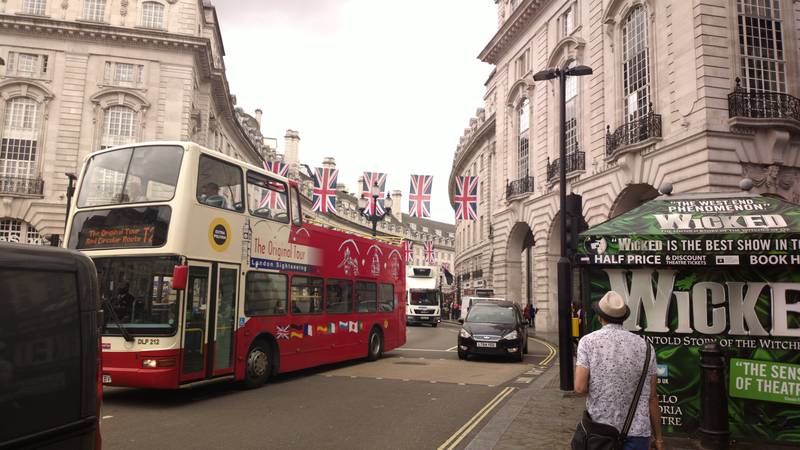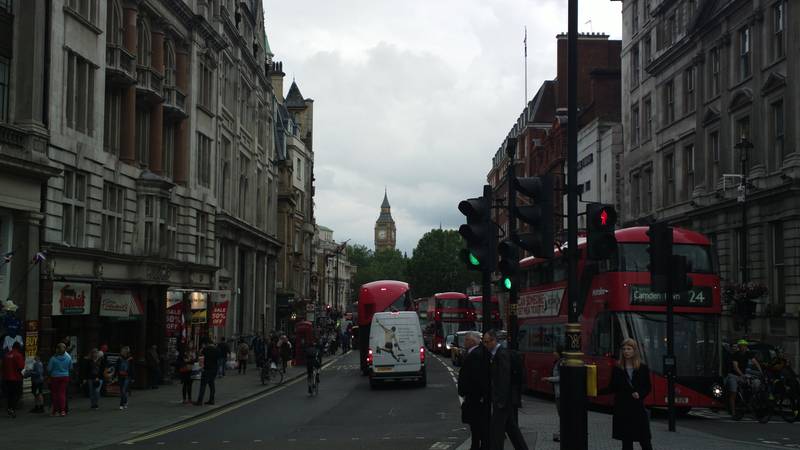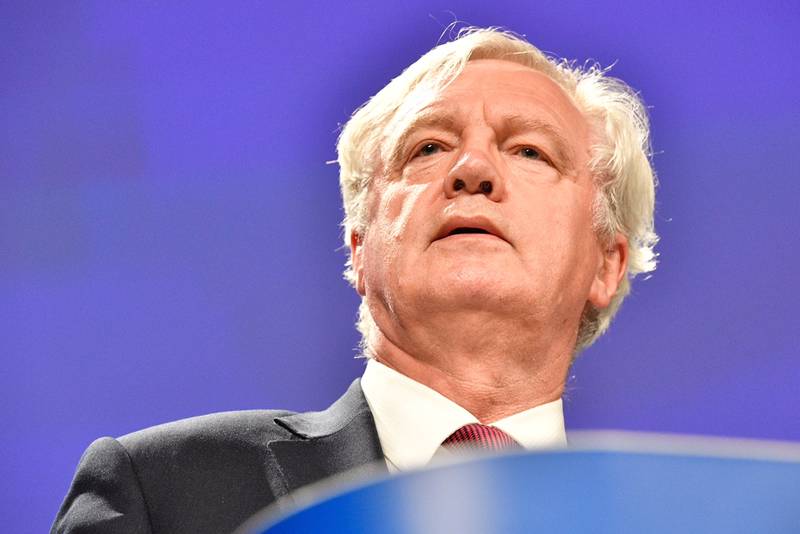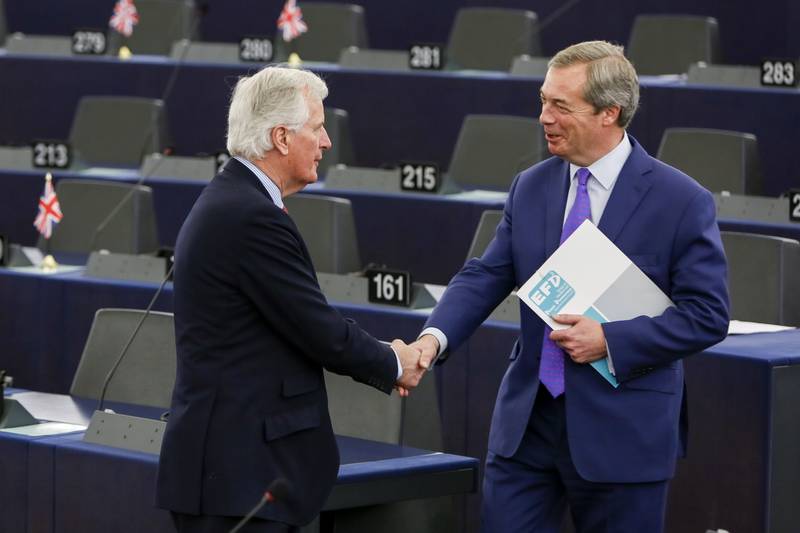Fortress England - the Bulgarian View on Brexit
Adelina Marini, Twitter: @AdelinaMarini, June 23, 2016

It is not often you know deep within you an event is historic, representing a sign of radical change, of an earthquake with a large magnitude. Today's European referendum in Great Britain undoubtedly is such an event. If Brits chose to leave the European Union, it would bring considerable change not only to the United Kingdom, but to the entire European continent. Should they decide to remain, there will be consequences as well. Bulgarian citizens, who have chosen Great Britain for their adopted homeland, feel the fatefulness of tomorrow’s decision and await with bated breath the fate that Brits will choose for them. Some of the Bulgarians that I spoke to in the last week shared that they are terrified by the upcoming referendum and the possibility of a Brexit (Britain exiting the EU). Others were not too perturbed by what is happening, but did feel something major was going on. Yet a third group were disappointed by having the right of vote taken away from them on a subject that concerns them so deeply.
Highly qualified Bulgarians, who managed to succeed, despite their origin, breaking the stigma that Bulgarians are low-qualified slackers who steal benefits, are the most terrified and constantly follow the news. Some of them, who have arrived to the UK fairly recently, have already made contingency plans in case the situation changes dramatically for the worse and they need to leave. Among people, who already have citizenship, there are those who are not as concerned about the future, with some even voting for a Brexit. Many agree, however, that Brits are stressed by Eastern Europeans, who are often better educated, speak several languages, are hard-working, and are more competitive at the local labour market.
The Eastern-European threat
Maria Spirova is a criminologist and editor for a legal publishing house in Oxford. She has been living in Great Britain for five years. She is very active in politics, both in events, happening in her new homeland and in Bulgaria. She defines herself as an Anglophile, although she lists in a single breath all the shortcomings of the British health system, administration, the problems of British society, political challenges. And while speaking with a true British humour, it is evident she likes the country. Her evaluation of what is going on is that all of Great Britain’s internal problems have found a culprit and it is the EU. Well protected Fascist sentiments have found an outlet. Eastern Europeans are the only ones, towards whom Brits feel no historic guilt, she tells me in her favourite surroundings – a multi-storey bookstore in the heart of London, in the company of a cup of mint tea.
“We come from class-less societies, we do not like being subservient”, she says. This opinion is shared by Milko Georgiev, who works in a large multinational company and has been in the UK for two years. Brits have a hard time placing us in their coordinate system, he says. Brits needed to hate someone, Maria continues. She explains it is a multi-faceted problem. On one side, there is the British middle class, which feels it has not been consulted, just milked, for too long now, who sees Brexit as a possibility of being heard and finally securing representation. Working class is at another level of the problem, feeling quite threatened by the cheap and relentless Eastern European labour. Maria feels that it is utterly impossible to have a rational conversation about the EU. There are instantaneous references being made to British society, which cannot come to terms with being a part of the puzzle, and not one of those solving it. What Brexit advocates really want is to stop time.
Her forecast is that if Brits vote to leave, there will be monstrous deportations of non-EU citizens. She is, however, worried about her own future as well. If she ever decides to switch jobs, it will probably be impossible, for there will probably arise some uncertainty about her status, which will in turn hinder her finding a new job. She shares that she often meets with the Brits’ perception of Bulgarians as strawberry-pickers, second-hand people. She says that in her communication with Englishmen she often hears their astonishment by her level of education and good command of the language. There are times when, after being recognised as a Bulgarian, she is asked straight-forward “And why are you not picking strawberries?”. Sometimes she gets sick by explaining she is human, Maria shares.
Biserka Anderson has lived in Scotland for seven years. As a former journalist she is passionate in following the British debate and gets disappointed. She feels truly aggrieved and offended. The entire anti-European campaign has totally shifted aside other important events and problems in the country. At the moment, the campaign is at the peak of hysteria. Biserka does not complain from discrimination. She has never felt any different treatment due to her background. Ever since she came to the country she has managed to find a job with no problems. She does, however, underline that Scotland does not have the same problem with migration as England does. She feels British media are showing a very twisted picture and even propaganda of who we, Bulgarians, really are. “They speak of us as second-hand Europeans”. It is not true that Bulgarians are just low-qualified strawberry-pickers. There are many Bulgarian university students in Scotland, she told me one Aberdeen morning in a central coffee shop. Most of them get excellent grades.
She also told me she would not feel well living in a country, which breaks away from Europe, the world, globalisation, from processes, which are natural. She feels offended by the fact that no one thinks of asking immigrants how they feel, what will happen to them if Great Britain left. They all wonder why she takes things so personally, she gets mad at not being able to convince them that they all face a momentous decision on Thursday. This is not a game. Others, who I spoke to shared that Brits are lazy and depend on Eastern-Europeans to do their work. Some complained about getting paid less because they are Eastern-Europeans, which they feel is unfair, but they are happy, for they would not get even that for the same amount of labour in Bulgaria. Not all are discriminated against and not everywhere. Not all like Great Britain, but all are happy about the opportunities it offers.
Fatme (her real name has been changed at her request) is a Syrian-Bulgarian or, maybe, a Bulgarian-Syrian. After meeting her, I believe she sees herself more as a Syrian, than as a Bulgarian. She ran away from Bulgaria because of xenophobic treatment of her and her family. She came here three years ago and already has her own business. She is happy. Does not look back. She explains the situation quite simply – if you are a janitor in Bulgaria, you will be a kicked about janitor, while here you are a respected janitor. Another advantage of Great Britain is that they do not discriminate by age here. It is difficult to get a job in Bulgaria even at the age of 35, while in the UK there is no such problem. Everyone was unanimous that if you prove worthy at your job, there are no problems. Whether this will remain so after a possible Brexit is something no one is sure of.
To Milko Great Britain is all Bulgaria is not. At the same time, he finds much in common in politicians’ talk in Bulgaria and Great Britain, which does not speak well of British politicians. The media environment also reminds him a lot of the Bulgarian one.
The hidden mine in education
Maria raised an issue which she laments having been dropped out of the agenda because of populism and demagogy. What will happen to education? She feels that if the UK exits the EU it is quite possible that student loans will disappear. She is disappointed there is no discussion of the EU’s effect on scientific exchange, and there is a risk of reversing scientific progress. She told me in detail about the new strategy of the interior ministry, aimed at schools and universities, allegedly aimed at fighting radicalism. She named the Home Office’s strategy a “brutal Stalinist policy” towards education. Any form of activism in schools is suspicious, being a devout Muslim is practically criminal, you need to be careful whom you appoint for managerial positions in universities as well, are some of Maria’s observations.
In universities, she goes on, a policy has been established of not accepting students, who could stay. There are expectations of mass academic exodus because of the great amount of pressure being levied on universities to re-Britanise. Biserka Anderson, who works in the University of Aberdeen, also told me about the education problem. She says that a lot of the funds for scientific research come from European funds. What will happen to all this, asks Biserka as we talk in a coffee shop in the centre of Aberdeen early in the morning, mere hours away from the referendum. She is convinced the university is the place most liable to damage from a possible Brexit.
The next day
Many Bulgarians feel spread-eagled at the moment. A great amount of insecurity will come for European citizens with a possible Brexit. They are not protected and will find themselves with no representation. No one understands the historical importance of tomorrow’s decision, laments Maria. According to her, it is about a “giant crisis of values in the Conservative party”. And Biserka adds that no one in Scotland wishes to live with Boris Johnson as prime minister. The debate has not touched ground for one second, explains Maria. She counts on some residual common sense prevailing, on a “Scottish scenario”, which at the last minute will tip the scales towards staying in. During our conversation in the London bookstore, MP  Jo Cox was murdered. According to Milko, whom I spoke to a day after the tragedy, this murder is just such a [Scottish] moment.
Jo Cox was murdered. According to Milko, whom I spoke to a day after the tragedy, this murder is just such a [Scottish] moment.
Maria warns about something else as well, which hardly anyone would expect of this part of the world. In her opinion, Brits are sliding “with increasing acceleration” towards totalitarianism. She judges by the attitude towards migrants and minorities. On a personal scale, she knows not what will happen to her. She no longer feels at home in Bulgaria, although she is politically strongly committed to her homeland. She feels much more useful for Bulgaria in Great Britain, than she would be if she returned. She does not feel at home in Great Britain as well. She said she comes back home to Oxford, but she actually knows not where she comes back to. Going back to the homeland, however, is not an option, due to lack of employment.
Fatme, despite being Muslim, is hostile towards refugees. If she is to choose who is to settle in Great Britain, she would chose Bulgarians, because they are easily integrated and civilised. And although she believes everyone deserves a fair chance, she is mad at many Muslims, who attempt to impose their own traditions. British society has achieved much and should not be easily surrendered to people, who have compulsive behaviour and impose their own culture. She feels there need to be some criteria and a grant period, in which all newcomers are to prove whether they could be a part of this society or not.
Biserka’s analysis is a different one, for it includes the extremely complex issue of the British union’s survival. She feels the predominant English feelings are typical for a “little England”. She fears a Brexit will create a “fortress England”, analogical to the fears of EU liberals of the creation of “fortress Europe” by the closing of borders to refugees and migrants. Biserka is sure that Scotland is free of this illness. She hopes the Brexit will bring Scottish independence. Scots feel much more European than the English. They are culturally different as well, she believes. She asked for a day off on Friday, so she can follow developments. Her forecast is that if Brits remain, but it is a very close call, there could be riots in England. Whatever the result, Pandora’s box has been opened, she says.
There are processes started, which cannot be stopped. Such is the Scots’ yearning for independence. If the vote to remain in the UK prevails in Scotland, surely a new process for separation from the British Union will ensue, for Scots will believe Brits are pulling them out of the European Union by force. The danger of tension in Northern Ireland too is not to be taken lightly, for it shares an island with the Republic of Ireland, reminds Biserka. The only prudent solution she sees is creating a British version of the European Union – an aggregation of sovereign states, which will decide their own destiny, but share a common market. Now that would be ironic at the background of current English feelings against the EU. Biserka concludes that if it comes to a new Scottish referendum, she will vote for exiting the fortress of England. If she did not have a family and a job, she would surely leave Great Britain, she says.
She does not want to live in a country, which has so many negative feelings in it, but she would not go back to Bulgaria either. Her hope that something could change was killed after the 2013 protests, which she experienced on a very personal level. Besides, she admits with regret that she has lost all connections with Bulgaria. She got disgusted by politics there, of the rotation of the same politicians. If she has to run from Great Britain, she would rather move to one of the “truly European countries”. According to her, those are Germany, The Netherlands, Belgium, Austria, even the Czech Republic, Poland, and Hungary. Those are countries in the centre of Europe, she says.
Some Bulgarians, who preferred to remain anonymous, on the other hand, want Great Britain to leave the EU, so an end could be put to social benefits tourism. Those are usually people, who came in before Bulgaria’s EU membership. It was difficult for them, they fought, and are now mad that their poor fellow countrymen are coming at a set table and instantly land on social benefits. Among people sharing this opinion there are low qualified workers, as well as people in the highest educational percentile, who have established themselves well in Great Britain. A statement I heard on several occasions was “It was hard enough getting rid of them in Bulgaria, now they come here.” The sentiment is shared by many, but not all are adamant that access to Bulgarians should be denied. On the contrary, everyone deserves a chance, most of them say.
Many of our fellow countrymen fear about the economy in Great Britain in the event of a Brexit. Forecasts are for heavy economic quakes, which could lead to them losing their jobs, the pulling out of investors and entire companies. Then they will have to look for another place where they will be able to provide for their families in peace. Alas, Bulgaria will not be such a place for a very long time to come. The big question is whether the EU could be such a place, or after “fortress England”, there will be many more fortresses being build around Europe. Today is B-Day – the day of Brexit or Bremain. A date, whose aftermath is comparable to May 9 – the Day of Europe.
Translated by Stanimir Stoev
 David Davis | © European Commission
David Davis | © European Commission Angela Merkel | © Council of the EU
Angela Merkel | © Council of the EU Michel Barnier, Nigel Farage | © European Parliament
Michel Barnier, Nigel Farage | © European Parliament